
Speciesism is a term used in philosophy regarding the treatment of individuals of different species. The term has several different definitions within the relevant literature. Some sources specifically define speciesism as discrimination or unjustified treatment based on an individual's species membership, while other sources define it as differential treatment without regard to whether the treatment is justified or not. Richard Ryder, who coined the term, defined it as "a prejudice or attitude of bias in favour of the interests of members of one's own species and against those of members of other species." Speciesism results in the belief that humans have the right to use non-human animals, which scholars say is pervasive in the modern society. Studies from 2015 and 2019 suggest that people who support animal exploitation also tend to endorse racist, sexist, and other prejudicial views, which furthers the beliefs in human supremacy and group dominance to justify systems of inequality and oppression.
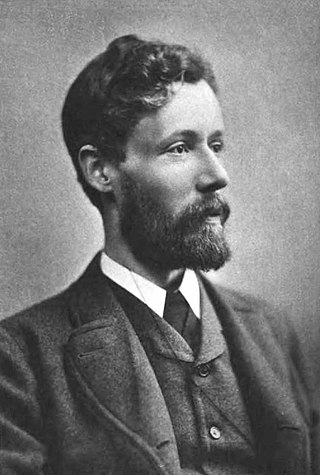
David George Ritchie was a Scottish philosopher who had a distinguished university career at Edinburgh, and Balliol College, Oxford, and after being fellow of Jesus College and a tutor at Balliol College was elected professor of logic and metaphysics at St Andrews. He was also the third president of the Aristotelian Society in 1898.

Henry Shakespear Stephens Salt was an English writer and campaigner for social reform in the fields of prisons, schools, economic institutions, and the treatment of animals. He was a noted ethical vegetarian, anti-vivisectionist, socialist, and pacifist, and was well known as a literary critic, biographer, classical scholar and naturalist. It was Salt who first introduced Mohandas Gandhi to the influential works of Henry David Thoreau, and influenced Gandhi's study of vegetarianism. Salt is considered, by some, to be the "father of animal rights," having been one of the first writers to argue explicitly in favour of animal rights, rather than just improvements to animal welfare, in his Animals' Rights: Considered in Relation to Social Progress (1892).

Stephen Richard Lyster Clark is an English philosopher and professor emeritus of philosophy at the University of Liverpool. Clark specialises in the philosophy of religion and animal rights, writing from a philosophical position that might broadly be described as Christian Platonist. He is the author of twenty books, including The Moral Status of Animals (1977), The Nature of the Beast (1982), Animals and Their Moral Standing (1997), G.K. Chesterton (2006), Philosophical Futures (2011), and Ancient Mediterranean Philosophy (2012), as well as 77 scholarly articles, and chapters in another 109 books. He is a former editor-in-chief of the Journal of Applied Philosophy (1990–2001).
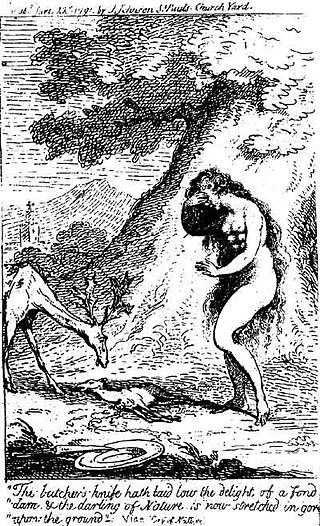
John Oswald was a Scottish philosopher, writer, poet, social critic, vegetarian and revolutionary.
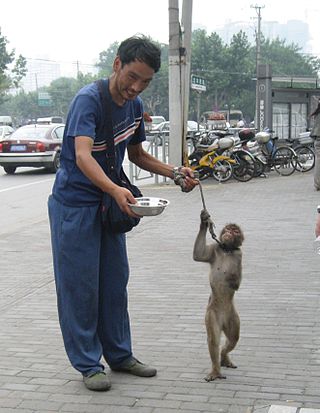
Animal rights is the philosophy according to which many or all sentient animals have moral worth independent of their utility to humans, and that their most basic interests—such as avoiding suffering—should be afforded the same consideration as similar interests of human beings. Broadly speaking, and particularly in popular discourse, the term "animal rights" is often used synonymously with "animal protection" or "animal liberation". More narrowly, "animal rights" refers to the idea that many animals have fundamental rights to be treated with respect as individuals—rights to life, liberty, and freedom from torture that may not be overridden by considerations of aggregate welfare.
Animal ethics is a branch of ethics which examines human-animal relationships, the moral consideration of animals and how nonhuman animals ought to be treated. The subject matter includes animal rights, animal welfare, animal law, speciesism, animal cognition, wildlife conservation, wild animal suffering, the moral status of nonhuman animals, the concept of nonhuman personhood, human exceptionalism, the history of animal use, and theories of justice. Several different theoretical approaches have been proposed to examine this field, in accordance with the different theories currently defended in moral and political philosophy. There is no theory which is completely accepted due to the differing understandings of what is meant by the term ethics; however, there are theories that are more widely accepted by society such as animal rights and utilitarianism.

The Humanitarian League was a British radical advocacy group formed by Henry S. Salt and others to promote the principle that it is wrong to inflict avoidable suffering on any sentient being. It was based in London and operated between 1891 and 1919.
The concept of moral rights for animals is believed to date as far back as Ancient India, particularly early Jainist and Hindu history. What follows is mainly the history of animal rights in the Western world. There is a rich history of animal protection in the ancient texts, lives, and stories of Eastern, African, and Indigenous peoples.
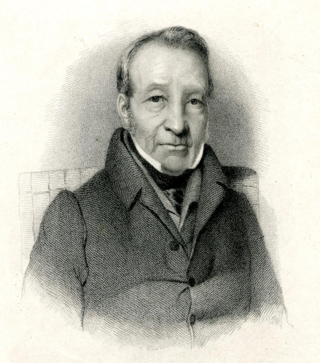
John Lawrence was an English writer on political and agricultural subjects and an early advocate of animal welfare and rights.

John Howard Moore was an American zoologist, philosopher, educator, humanitarian and socialist. He is considered to be an early, yet neglected, proponent of animal rights and ethical vegetarianism, and was a leading figure in the American humanitarian movement. Moore was a prolific writer, authoring numerous articles, books, essays, pamphlets on topics including animal rights, education, ethics, evolutionary biology, humanitarianism, socialism, temperance, utilitarianism and vegetarianism. He also lectured on many of these subjects and was widely regarded as a talented orator, earning the name the "silver tongue of Kansas" for his lectures on prohibition.

The Universal Kinship is a 1906 book by American zoologist, philosopher, educator and socialist J. Howard Moore. In the book, Moore advocated for a secular sentiocentric philosophy, called the Universal Kinship, which mandated the ethical consideration and treatment of all sentient beings based on Darwinian principles of shared evolutionary kinship, and a universal application of the Golden Rule; a direct challenge to anthropocentric hierarchies and ethics. The book was endorsed by Henry S. Salt, Mark Twain and Jack London, Eugene V. Debs and Mona Caird. Moore expanded on his ideas in The New Ethics, published in 1907.

Charles Russell Magel was an American philosopher, animal rights activist and bibliographer. He was professor emeritus of Philosophy and Ethics at Moorhead State University.
Humphrey Primatt was an English clergyman and animal rights writer. Primatt has been described as "one of the most important figures in the development of a notion of animal rights."
Moral Inquiries on the Situation of Man and of Brutes is an 1824 book by Lewis Gompertz, an early animal rights advocate and vegan. In the book, Gompertz lays out a moral framework for the treatment of and obligations towards humans and other animals, arguing against the consumption of meat, milk, eggs, silk and leather, denouncing vivisection and arguing for aiding animals suffering in the wild.
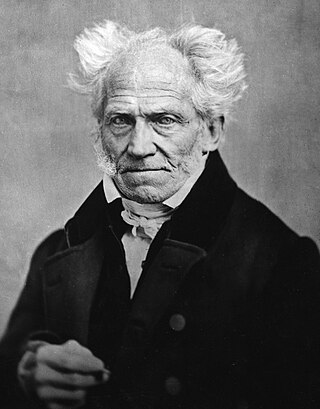
Arthur Schopenhauer was a 19th-century German philosopher. He was an early defender of animal rights, going against the prevailing idea at the time that animals had no rights and only had instrumental value to humans. According to Schopenhauer, "The assumption that animals are without rights and the illusion that our treatment of them has no moral significance is a positively outrageous example of Western crudity and barbarity. Universal compassion is the only guarantee of morality." Schopenhauer argued that animals should be treated with respect and compassion, as they, like humans, are subjected to the metaphysical will, and experience suffering and craving as a result.
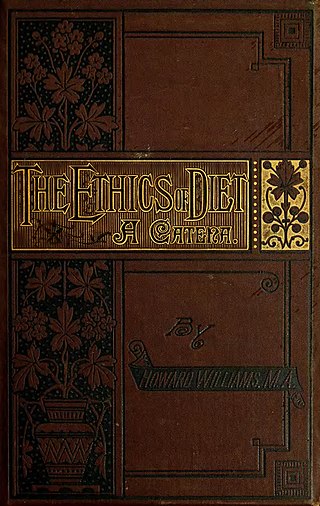
The Ethics of Diet: A Catena of Authorities Deprecatory of the Practice of Flesh-eating is an 1883 book by Howard Williams, on the history of vegetarianism. The book was influential on the development of the Victorian vegetarian movement.
The replaceability argument, or the logic of the larder, is a philosophical argument that has been used to reject vegetarianism. It holds that consuming nonhuman animal products is good for animals because if they were not consumed, fewer animals would be brought into existence. The argument has particularly been engaged with within the context of utilitarianism.
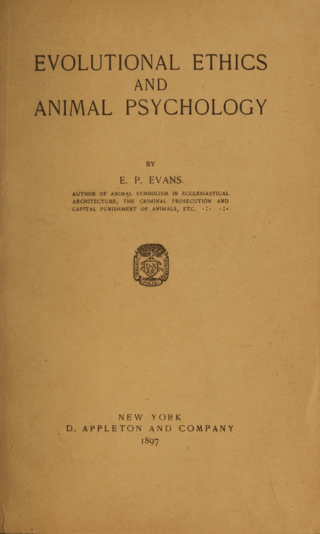
Evolutional Ethics and Animal Psychology is an 1897 book by the American scholar and early animal rights advocate Edward Payson Evans, which argues for the use of animal psychology as the basis for animal rights in the historical evolution of ethics.














